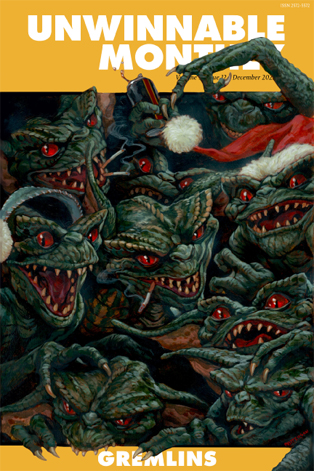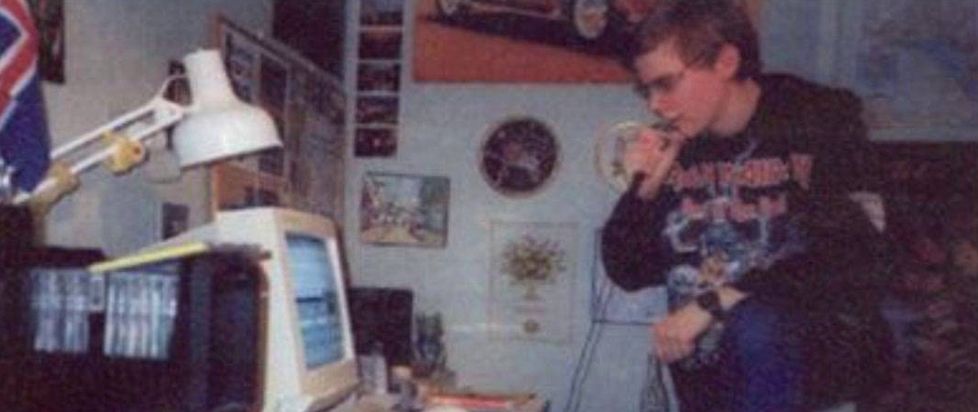
In the Spaceship Over Glasgow With Mogwai

This column is a reprint from Unwinnable Monthly #158. If you like what you see, grab the magazine for less than ten dollars, or subscribe and get all future magazines for half price.
———
Where videogames meet real life…
———
Mogwai are synonymous with post-rock. Formed in 1995 and named after the gremlin-progenitor from the film series of the same name, it’s impossible to talk about the genre without name dropping the influential Glaswegians (and vice versa). However, their status as one the world’s preeminent post-rock bands was achieved accidentally. In a 2008 interview with Chillville, multi-instrumentalist Barry Burns explains that no one in the band is comfortable with the term and that he hates The Wire (one of a handful of magazines commonly credited for helping to coin the phrase post-rock) because it “overanalyzes everything.”
For anyone familiar with Mogwai and post-rock, this might sound equivalent to, say, Metallica denouncing themselves as metal. The more you understand about Mogwai though, the more their resistance to categorization makes sense, despite whatever benefits they’ve enjoyed by being an unwitting cornerstone in an entire genre’s development. They are a case study in radical authenticity, often copied but never duplicated, and rarely understood as well as they should be.
I first heard about Mogwai through British guitar magazines while living in England during high school. Since this was before my family had high-speed Internet and they never came on TV, everything I knew about the band up to that time was through written word. While I don’t recall those publications ever using any post-whatever adjectives to describe the band’s sound, I understood their songs were predominantly instrumental and they used a lot of guitar pedals.
Beyond that, I had zero idea what to make of Mogwai. I was a young metalhead with no context for any other bands that sounded like them, and all the details I could glean from those magazine stories seemed incongruous. What could this band that wore Slayer T-shirts but played Fender Telecasters and were frequently mentioned in the same breath as boring Britpop bands possibly sound like and who was the audience? I wasn’t sure if their music was anything I’d be interested in, but I could tell they were more compelling than a run-of-the-mill indie band (a term that had different sonic connotations across the pond than in the United States).

Years later in college, I got into post-rock through bands like Explosions in the Sky and Russian Circles. In the process of tracing my way through the genre’s history, I eventually found my way back to Mogwai and learned that not only were they not a weird Britpop band, but they were considered one of the historical cornerstones of post-rock (whether they care for that designation or not). While my sense that they were different was accurate, I was wildly mistaken about who their peers even were to begin with (certainly not bands like Blur, as this infamous shirt design made abundantly clear).
I started my exploration of Mogwai’s catalog with their sixth album The Hawk is Howling (2008), a record that’s generally considered middle-of-the-road relative to the rest of their discography, but one that remains a personal favorite of mine. Their tasteful utilization of tension and release lent a somewhat darker vibe to the proceedings than what was typical from American post-rock bands. Song titles like “I’m Jim Morrison, I’m Dead” also telegraphed dark humor and dry wit, which was a refreshing contrast to the genre’s tendency toward tiresome self-seriousness.
Indeed, Mogwai weren’t exactly like most other post-rock bands. While Sigur Ros claimed they were going to change the way people thought about music (though to be fair, who’s to say they didn’t succeed), Mogwai were much humbler and more self-aware. Their sound is grandiose, but their feet are planted firmly on the ground, possessing very little patience for pretentiousness and no compunction for puncturing inflated egos. In terms of attitude, they felt more aligned with the spirit of punk rather than indie rock, which spoke to my taste and values much more directly than most forgettable post-rock also-rans (who don’t need to be named in this column).
On their second album Come On Die Young (1999), which was recently rereleased along with their debut Young Team (1997), Mogwai planted their flag in the ground on the opening track “Punk Rock.” It’s an ambient wash of guitar noise that swirls underneath a sampled clip from a late-1970s CBC interview with Iggy Pop wherein “the godfather of punk” expresses disdain for the term punk rock being used to dismiss music that the masses had misconstrued as degenerate. As Stuart Berman wrote for Pitchfork in 2014, “As much as it overtly asserts Mogwai’s allegiance to the rock iconoclasts of yore, the track also betrays the band’s own frustration with being misunderstood.”
At the risk of overanalyzing the track, it’s easy to see why Mogwai felt the need to make a bold opening statement on the record. They didn’t fit with Britpop (which the more mainstream magazines I read seemed to align them with) but they also didn’t want to be overhyped as the future of post-rock (which much cooler magazines that I was not reading were hailing them as the future of). It’s also likely they were keenly aware of the tension between their rising stature and the British rock press’s ability to destroy bands as fast as it builds them up.

The specific sample they chose to make that statement was not a coincidence. In his new book Spaceships Over Glasgow: Mogwai, Mayhem, and Misspent Youth (the title being a reference to a lyric on “Take Me Somewhere Nice” from the second track on their 2001 third record Rock Action), guitarist and rare vocalist Stuart Braithwaite writes, “Iggy was the living embodiment of that complete don’t-give-a-fuck attitude.” Sonically, Iggy Pop might seem like an unlikely influence for a polished and pensive post-rock act. Spiritually, however, his impact the “godfather of punk” on the band’s approach is clear.
Too many generic post-rock bands (many of which have borrowed elements from Mogwai’s sound without ever understanding what makes Mogwai interesting) are content to color inside the lines, primarily borrowing inspiration from other post-rock bands, and doing so with insufferable pretentiousness. At its worst, it’s beyond boring, lacking any of the energy or vibrancy that makes rock music, well, rock music at all.
Mogwai, meanwhile, have always stridently done their own thing while drawing upon a broad range of influences from across the underground rock spectrum, and they’ve done so with a self-assured attitude that has allowed them to freely explore what can be achieved with little more than guitars, bass, and drums. They’ve never been afraid to speak their minds (even if they rarely speak on their records) and the things that make them compelling are as intangible as they are readily apparent in their sound.
They are a rare example of what can be achieved by following your own vision, liking what you like regardless of what tastemakers might say, and pressing onward regardless of whether anyone gets what you’re doing. They are more than just a rock band and more than just the reluctant elder statesmen for a genre they never felt any affinity with. They are, in short, the promise of punk made manifest.
———
Ben Sailer is a writer based out of Fargo, ND, where he survives the cold with his wife and dog. His writing also regularly appears in New Noise Magazine.




